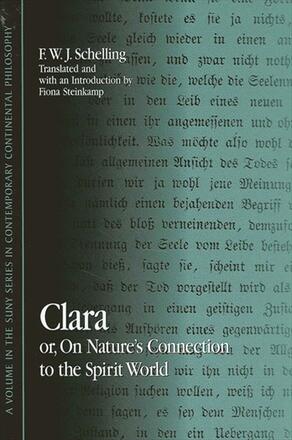
Clara
or, On Nature's Connection to the Spirit World
Alternative formats available from:
Part novella, part philosophy, Clara was Schelling's most popular work during his lifetime, and appears here in English for the first time.
Description
This is the first English translation of Schelling's novel, most likely written after the death of his first wife, Caroline, the former wife of August Wilhelm Schlegel. Although only a fragment, Clara remains unique. Part novella, part philosophical tome, its central theme is the connection between this world and the next. Schelling masterfully weaves together his knowledge of animal magnetism, literary techniques, and his doctrine of the potencies to make his philosophy accessible to all.
Steinkamp addresses the main issues concerning the dating of the work—many commentators have deemed Clara to be a sketch for Schelling's The Ages of the World or an outline for the third, missing book of that work—and provides a short biography of Schelling with particular emphasis on events claimed to play a role in the conception of Clara, such as the deaths of both Caroline and her daughter, Auguste. She also shows how passages in Clara are strikingly similar to the content of Schelling's touching letters mourning Caroline, written to Pauline, the daughter of Caroline's best friend and the woman who would become his second wife. Clara, strongly influenced by the Romantic movement, is an early illustration of Schelling's attempt to unite his positive and negative philosophy.
Fiona Steinkamp is Professor of Psychology at the University of Edinburgh.
Reviews
"Schelling is now emerging as one of the most important thinkers of the nineteenth century and this is a text of decisive importance to an appreciation of his work. " — Jason M. Wirth, translator of The Ages of the World